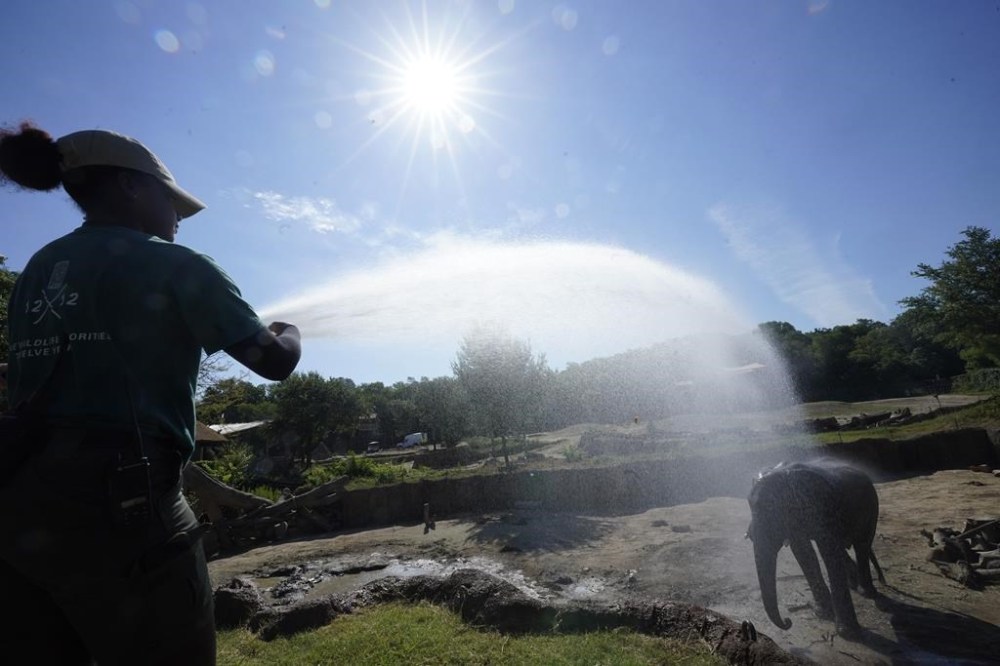Tuesday set an unofficial record for the hottest day on Earth. Wednesday may break it.
Advertisement
Read this article for free:
or
Already have an account? Log in here »
We need your support!
Local journalism needs your support!
As we navigate through unprecedented times, our journalists are working harder than ever to bring you the latest local updates to keep you safe and informed.
Now, more than ever, we need your support.
Starting at $15.99 plus taxes every four weeks you can access your Brandon Sun online and full access to all content as it appears on our website.
Subscribe Nowor call circulation directly at (204) 727-0527.
Your pledge helps to ensure we provide the news that matters most to your community!
To continue reading, please subscribe:
Add Brandon Sun access to your Free Press subscription for only an additional
$1 for the first 4 weeks*
*Your next subscription payment will increase by $1.00 and you will be charged $20.00 plus GST for four weeks. After four weeks, your payment will increase to $24.00 plus GST every four weeks.
Read unlimited articles for free today:
or
Already have an account? Log in here »
Hey there, time traveller!
This article was published 05/07/2023 (971 days ago), so information in it may no longer be current.
The planet’s temperature spiked on Tuesday to its hottest day in at least 44 years and likely much longer, and Wednesday could become the third straight day Earth unofficially marks a record-breaking high, the latest in a series of climate-change extremes that alarm but don’t surprise scientists.
The globe’s average temperature reached 62.9 degrees Fahrenheit (17.18 degrees Celsius) on Tuesday, according to the University of Maine’s Climate Reanalyzer, a common tool based on satellite data and computer simulations and used by climate scientists for a glimpse of the world’s condition. On Monday, the average temperature was 62.6 degrees Fahrenheit (17.01 degrees Celsius), breaking a record that lasted only 24 hours.
While it is not an official National Oceanic and Atmospheric Administration record, “this is showing us an indication of where we are right now,” NOAA chief scientist Sarah Kapnick said. Even though the dataset used for the unofficial record goes back only to 1979, she said that given other data, it’s likely the hottest day in “several hundred years that we’ve experienced.”

The previous hottest day was in August 2021, Kapnick said.
“A record like this is another piece of evidence for the now massively supported proposition that global warming is pushing us into a hotter future,” said Stanford University climate scientist Chris Field, who was not part of the calculations.
With many places seeing temperatures near 100 degrees Fahrenheit (37.8 degrees Celsius), the new average temperatures might not seem very hot. But Tuesday’s global high was nearly 1.8 degrees Fahrenheit (a full degree Celsius) higher than the 1979-2000 average, which already tops the 20th- and 19th-century averages.
Higher temperatures translate into brutal conditions for people all over the world. When the heat spikes, humans suffer health effects — especially young and elderly people, who are vulnerable to heat even under normal conditions.
“People aren’t used to that. Their bodies aren’t used to that,” said Erinanne Saffell, Arizona’s state climatologist and an expert in extreme weather and climate events. “That’s important to understand who might be at risk, making sure people are hydrated, they’re staying cool, and they’re not exerting themselves outside, and taking care of those folks around you who might be at risk.”
The highs come after months of “truly unreal meteorology and climate stats for the year,” such as off-the-chart record warmth in the North Atlantic, record low sea ice in Antarctica and a rapidly strengthening El Nino, said University of Oklahoma meteorology professor Jason Furtado.
Scientists generally use much longer measurements — months, years, decades — to track the Earth’s warming. But the new figures are an indication that climate change is reaching uncharted territory, even if the data aren’t quite the type used by gold-standard climate measurement entities such as the National Oceanic and Atmospheric Association.
The figures legitimately capture global-scale heating, and NOAA will take them into consideration for its official record calculations, said Deke Arndt, director of the National Center for Environmental Information, a division of NOAA.

High-temperature records were surpassed this week in Quebec and Peru. Beijing reported nine straight days last week when the temperature exceeded 35 degrees Celsius (95 degrees Fahrenheit). Cities across the U.S. from Medford, Oregon to Tampa, Florida have been hovering at all-time highs, said Zack Taylor, a meteorologist with the National Weather Service.
Wednesday may bring another unofficial record, with the Climate Reanalyzer again forecasting record or near-record heat. Antarctica’s average forecast for Wednesday is a whopping 4.5 degrees Celsius (8.1 degrees Fahrenheit) warmer than the 1979-2000 average.
In the U.S., heat advisories are in effect this week for more than 30 million people in places including portions of western Oregon, inland far northern California, central New Mexico, Texas, Florida and the coastal Carolinas, according to the National Weather Service Weather Prediction Center. Excessive heat warnings are continuing across southern Arizona and California.
___
Borenstein reported from Washington and Walling from Chicago.
___
Follow AP’s climate and environment coverage at https://apnews.com/hub/climate-and-environment

___
Follow Seth Borenstein and Melina Walling on Twitter at @borenbears and @MelinaWalling.
___
Press climate and environmental coverage receives support from several private foundations. See more about AP’s climate initiative here. The AP is solely responsible for all content.
